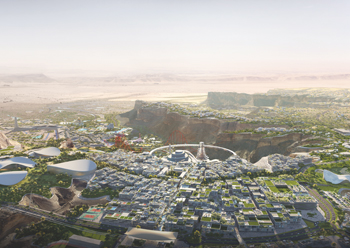
In line with Saudi Arabia’s vision to boost its tourism potential, major developments are under way at AlUla, the kingdom’s growing hub for culture and heritage.
Among the projects announced last month are hotel and resort brand Aman’s plans to set up three resorts in the city situated in north-western Saudi Arabia in the Madinah governorate; as well as the redevelopment of AlUla’s Prince Abdulmajeed Bin Abdulaziz Airport and the Maraya Concert Hall.
Aman has signed a partnership deal with the Royal Commission for AlUla (RCU) to develop its first Middle East properties in AlUla. Under the terms of the agreement, the hotel and resort brand will develop three distinct luxury resorts. Detailed design work on all three properties is scheduled to commence in the coming months with a development timeline that aims to welcome the first guests in 2023.
Aman’s CEO Vladislav Doronin comments: “Many of our existing Aman destinations are located in areas of outstanding natural beauty and rich history. With the addition of the spectacular AlUla, this takes us to 10 properties situated near or in Unesco heritage sites, making it a fitting location for our first destination in the Middle East.”
The Aman partnership is the second major international resort development for the AlUla region and follows the planned Jean Nouvel-designed resort within the Sharaan Nature Reserve, showcasing architecture hosted by nature.
The first of the Aman developments will be a spa concept resort featuring 30 luxury tents being developed within a secluded and tranquil mountain valley that is close to many of AlUla’s main cultural and heritage areas.
The second resort will be constructed in an area of outstanding natural beauty and will reinforce Aman’s global commitment to delivering transformative experiences in awe-inspiring locations.
A third resort will encompass a desert-ranch style with panoramic views of the natural beauty of AlUla.
Meanwhile, work to transform AlUla’s Prince Abdulmajeed Bin Abdulaziz Airport and the Maraya Concert Hall is under way and will be completed by the end of this year.
The airport development project will transform the city’s domestic airport into an aviation hub, increasing its capacity fourfold from 100,000 passengers to over 400,000 a year, marking an important step in the RCU’s overall aim to accommodate two million tourists by 2035.
Work on the Maraya Concert Hall – venue for the Winter at Tantora Festival – includes structural improvements and renovation to create a larger, permanent facility, seating more than 500 people.
The acoustics at the hall are being upgraded to operatic performance quality, and a 500-seat restaurant is being created, along with an art exhibition space and a new rooftop terrace.
The mirror-clad walls of the structure, designed to form an extension of the environment by reflecting views of the surrounding golden sands and mountains, will remain as an integral part of the concert hall’s design.
RCU’s development work in AlUla encompasses a broad range of initiatives across archaeology, tourism, culture, education and the arts, reflecting the ambitious commitment to boost tourism and leisure in Saudi Arabia, outlined in Vision 2030. The plan includes transforming the city into a dedicated open, living museum – the first of its kind in the world.
AlUla, which covers 22,561 sq km, includes a lush oasis valley, towering sandstone mountains and ancient cultural heritage sites dating back thousands of years.
The most well-known site in AlUla is Hegra, Saudi Arabia’s first Unesco World Heritage site, which features more than 100 well-preserved tombs with elaborate facades cut out of the sandstone outcrops surrounding the walled urban settlement.
In addition to Hegra, AlUla is home to a series of fascinating historical and archaeological sites such as Ancient Dadan, the capital of the Dadan and Lihyan kingdoms, which is considered one of the most developed First-millennium BCE cities of the Arabian Peninsula; thousands of ancient rock art sites and inscriptions; and Hijaz Railway stations.





















_0001.jpg)


.jpg)
















.jpg)








.jpg)


